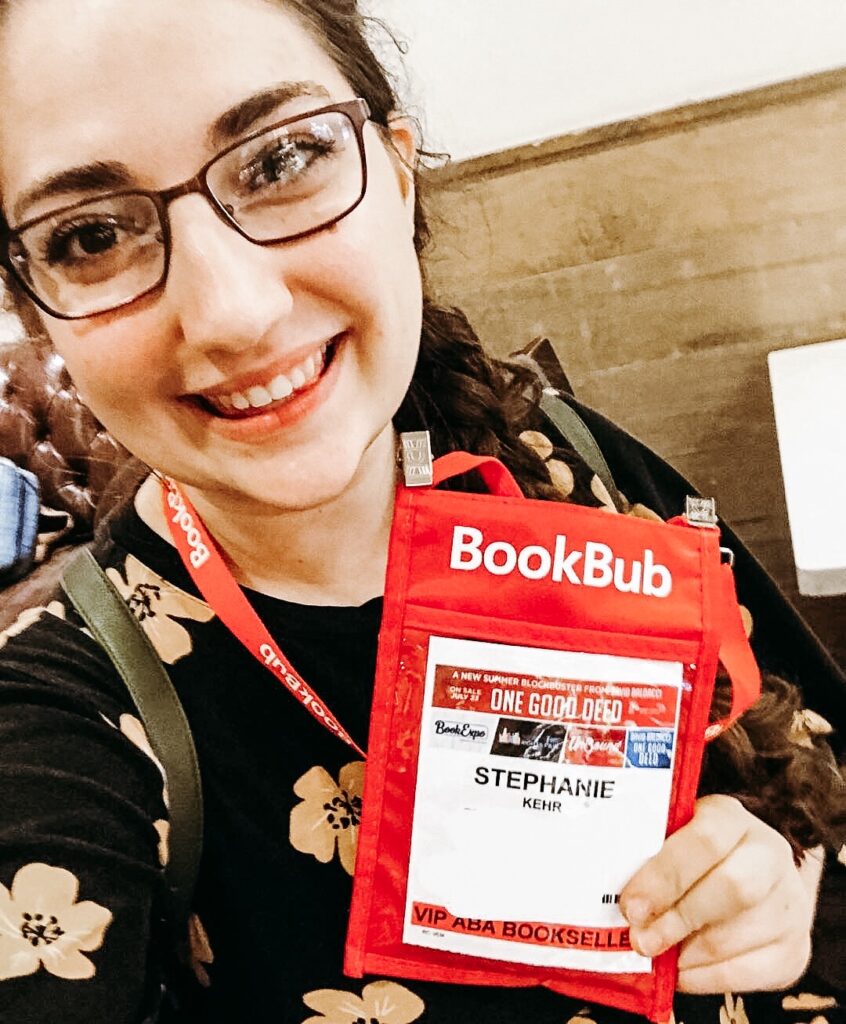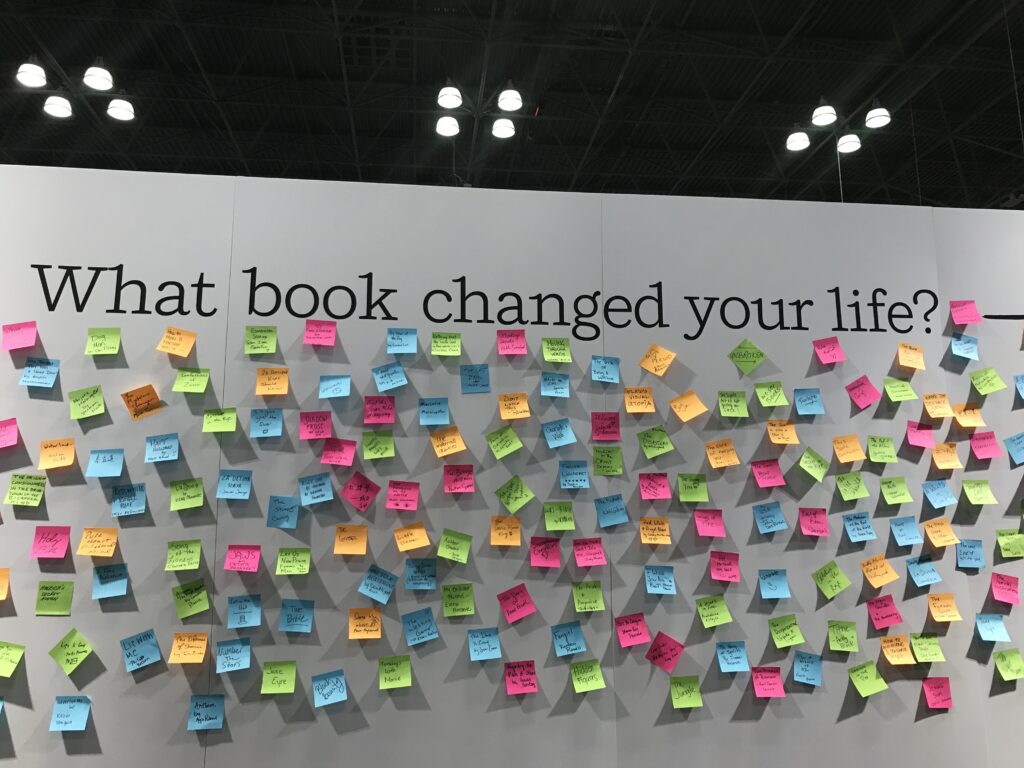ME
NU
Word from Home
I'm Stephanie
You’ve arrived! Welcome to The Everywhere Girl, a slow living blog that helps you cultivate a sense of home in any space or season. I’m Stephanie, resident writer, chronic wanderer, and hospitality enthusiast. I’m so glad you’re part of the community.
My love letter to home. These notes come to you from across the continent, across the globe, and across the hall.
Steeped in faith, literature, and self-discovery, they’re my way of finding home within myself, and with all of you.
I Take It Back: Authors Don’t Need a Platform, They Need a Brand

Posted In
October 8, 2025
Posted On
If you’ve been to any writers’ conference or publishing event, you know that building an author platform is nonnegotiable. But if you’re feeling burned out and unsuccessful with your social media accounts, you’re not alone. Here’s how to create something even more valuable than an author platform: a personal brand.
Chapters
- Your Online Platform Bridges the Gap for Low Book Sales
- The Publishing Industry Needs a Massive Shift – And We Get to Choose Where It Goes
- The Pros and Cons of Building an Author Platform
- Should You Stop Building Your Author Platform?
- Authors Don’t Need a Platform: They Need a Brand
- How to Build an Author Brand
- What Are the Advantages of Building an Author Brand?
- Should You Build an Author Brand or Have Zero Online Presence?
- More Unsolicited Publishing Advice

Someone recently asked me, “What are you doing to build your author platform?”
That question took me by surprise. Especially because my answer these days is a hard and emphatic “nothing.”
What a wild turn of events for someone who used to sit on expert panels at writing conferences, right?
It was once my job to teach authors how to start an email list, grow their Instagram account, and market in the online space. I sat in professional meetings and nodded my head when famous publishing pros said, “The most important thing you can tell your authors is to build a platform.”
Five years later, I’ve taken some much-needed space from the publishing world. Honestly, it’s an intense industry with a lot of opinionated people. Plus, I’m now the owner of a thriving copywriting agency that specializes in strategic marketing.
Although I’d love to write and publish books in the future, I’m no longer taking advice from my past self. Building an author platform was both unhealthy and unproductive for me.
Here’s how I came to that conclusion, and what I’m doing now instead…
Your Online Platform Bridges the Gap for Low Book Sales
Books have always been at the center of my life. I got a publishing contract for my first novel in high school and worked as a literary agent in my early 20s.
At the time, it all felt so enchanting. Reading, writing, and fighting for stories is my actual dream. Plus, I got to meet awesome writers and visit places like Scholastic in New York City (pinch me).
But I got a front seat to the issues in the publishing industry, too.
Here’s the main one: People aren’t buying books like they used to. And the industry is constantly scrambling to fix that.
According to Publishers Weekly, 40% of publishing jobs have disappeared in the last 30 years. That’s an alarming statistic. These jobs include editors, marketers, and many of the brilliant and innovative minds behind your favorite books. And the publishing industry wants to replace these essential jobs with you, the author.
What was once a thriving industry is now only surviving. But instead of finding updated sales techniques to fit the current market, the industry wants to use your platform to generate revenue. In fact, the obsession with platforms is so intense that social media influencers and TV personalities are more likely to get published than professional writers.
If you’ve been to a writing conference recently, you know exactly what I’m talking about. Maybe you’ve even sat in the expert panels and intensives that teach you about platform building.
Over time, the quality of published books has dropped because the industry values social media followers more than writing talent. By trying to increase book sales and revenue in a dying market, we’re losing the integrity of the work.
There has to be a better way forward, right?

The Publishing Industry Needs a Massive Shift — And We Get to Choose Where It Goes
Don’t get me wrong, I love traditional publishing. I loved the stories, the editors, the thrill, the conferences, the authors — everything. But across every facet of the industry, from editors to agents to authors, the conversations were the same: Publishing needs to change. We just don’t know how to do it.
Five years ago, I felt just as lost as everyone else. But after working more in marketing and running my own business, I have a better idea of how to move forward as an author.
Before I talk about that, here’s some good news: If authors are now responsible for making their own sales, that means we get to be the ones to make the shift. How awesome that we get to decide where this industry goes from here.

The Pros and Cons of Building an Author Platform
I’ve heard plenty of professionals say that authors have to build a platform. Without an author website, email list, and social media accounts, you can’t sell books. But this just isn’t true. Self-marketing is a huge undertaking, and you deserve to know the pros and cons before you commit.
Here Are the *Pros* to Building an Author Platform:
You’re more likely to get a book contract
This is 100% true, you’re way more likely to sign with a publisher if you have thousands of TikTok followers.
You hold negotiating power
Whether you want more royalties, a stronger marketing budget, or final say on cover art, your online platform gives you more negotiation power.
You get to decide what you write
If you’re a brand-new author, you may need to break into the industry with a story in a highly marketable genre (right now, it’s romantacy). But if you have a platform, there’s more flexibility to choose what you want to write.
You might get a publishing offer without asking for it
Most authors spend years pitching agents and editors before they get a contract. But I know people with huge social media followings who were offered publishing deals with no book pitch.
Here Are the *Cons* to Building an Author Platform:
Your writing doesn’t get to be the priority
The hours you spend writing and curating social posts could be spent honing your writing craft. In fact, if you’re a new writer, I would argue that’s how it should be spent.
New writers don’t have anything to sell
Authors are advised to build a platform before they approach agents and editors. But it takes a few years to write, pitch, and publish a book. This means you have a significant time lapse between building a platform and having a physical product. So your platform has no anchor or call-to-action. From a marketing perspective, this is a frustrating, unproductive, and unprofitable practice that leads to burnout. And no, a free e-book in your Instagram bio isn’t enough to solve this problem.
Platform doesn’t equal conversion
This is where authors deserve better marketing education. No one’s going to tell you that only about 2–4% of your followers will actually buy your book. Obviously, this varies, but it’s a pretty average conversion rate for a beginner marketer.
Let’s actually do the math on this. Say, you’re super dedicated to your social media platform and spend two hours on it every week for three years. You gain 5,000 followers across all platforms, and once you publish a book, you get a solid conversion rate of 4%. In total, you’ve spent 312 hours on social media and sold 200 books. You signed a good contract, so you get 10% royalties on all sales, and your book costs $20. That means you earn $400 from your social media accounts after three years of dedicated effort — which translates to $1.28 per hour.
Let’s be clear: These numbers are just for marketing. They don’t consider the hours you spend actually writing your book. Sure, there are other non-financial benefits to building a platform (see the “pros” section), and writers rarely go into this field to get rich. But these are important numbers to consider based on time investment, especially if you only have evenings and weekends for writing.
For me, this raises two questions:
- What if I put those hours into honing my writing craft?
- Or what if I found a marketing avenue that’s more profitable than a “platform”?
Dopamine is the real driver behind platform building
Online marketing is tricky. Often, you’re getting paid in the “dopamine dollars” you earn through likes, shares, and comments. But you’re not paid in actual dollars and rarely in authorly success. Above, we broke down the financial numbers for someone who builds a successful author platform. But think about how many writers you know who are spinning their wheels on 700 followers. They keep investing their time with no real payoff.
Should You Stop Building Your Author Platform?
If you’re thinking, “Yes, that’s me, I am spinning my wheels on 700 followers,” you might consider halting your platform building. I know, that goes against everything you’ve heard from the publishing professionals, right?
Here are some reasons I might advise someone to stop building a platform:
You’re a beginner writer
There’s a lot to be said about honing your craft and honoring the sacred space of writing. The reality is, most authors won’t have publishing success with the first book they write anyway — and that’s a good thing. You need time to practice your skill without stress, expectation, hefty deadlines, or social media doomscrolling. I’ve been on the receiving end of book pitches, and quality writing will always win over a robust email list.
You’re writing fiction
Even though publishing professionals are obsessed with platform building, most agree that you don’t need thousands of followers for fiction. It’s nice to have a platform, but it’s not a requirement. In fact, it’s often hard to convert an Instagram audience to buy your novel, anyway.
Your wheels are spinning
If you’ve been building a TikTok account for multiple years and only have a few hundred followers, your time would be better spent elsewhere. Take a break and come back to it another time.
You’re burned out, chronically ill, or working full time
When a beginning author has limited time or capacity for writing, I always recommend the book over the platform. Don’t feel guilty about logging off social media so you can focus on what’s important.
Your audience isn’t built for conversions
The ideal audience is so important in marketing. This is all about finding the people who feel wildly enthusiastic about you and your future book. If you’re doing follow chains between authors or just looking to boost your numbers, then your audience isn’t optimized for conversions. Most likely, they’re a low value following that won’t do much for actual sales.
Your engagement is super low
Social media isn’t what it used to be. Gone are the days when you could post a few writing tips and gain dozens of followers. And, it’s not just you who’s experiencing this. I’ve met huge social media influencers who are only reaching a small fraction of their audience due to low engagement. The algorithm just isn’t forgiving these days, and it’s not always worth spinning your wheels on.
You care more about the attention than the craft
Honestly, it’s easy to get wrapped up in the fame of writing. The idea of becoming the next Suzanne Collins or proving your high school bullies wrong is appealing, and it’s easy to get into that headspace when you have success online. But this isn’t a good reason to write or build a platform, and I promise you’ll want to work through this before you gain writing success.
Authors Don’t Need A Platform: They Need a Brand
Author to author, I just want you to know that platform is a choice, not a requirement. Just like anything else, there are real pros and cons — and a ton of nuance. But if you do want to increase your chances of getting published through your online following, let me suggest a brand, not a platform.
Platform vs. brand: What’s the difference?
Publishing professionals use the words platform and brand interchangeably, but they couldn’t be more different.
- Think of a platform as something you build to talk to people. Essentially, “if you build it, they will come.” You’re using YouTube, social media, Pinterest, and your email subscribers to talk to anyone who will listen about your books and writing life.
- A brand is much more strategic. Instead of marketing to everyone, you’re selling (or giving) a specific product to your ideal client. This comes with a visual identity, branded content, and it results in followers who are much more engaged. You might assume your favorite influencer is just sharing their life, but if they’re successful, I’d guess they’ve branded themselves around clean living, fashion, travel, writing advice, or couples content.
How to Build an Author Brand
There are advantages to having an online presence as a writer. If you have the time, energy, and skill to build a real brand, this could be your ticket to your dream publishing contract. Here’s how to build it:
Find a topic you could talk about all day
Your brand doesn’t have to be writing related, but it does have to be something you’re an expert in. Gain inspiration from online creators and look for spaces that aren’t oversaturated. You could offer tips for writing, home improvement, hospitality, vintage fashion, or even nutrition.
Create a product
Your product is the backbone of your brand. It’s the destination where you send your followers. Consider an online resource, physical product, value-packed YouTube series, or online course. Whatever you choose, make sure it fits your brand. You’ll probably want a multistep plan for future product launches, too.
Pick two online platforms that light you up
Spreading yourself too thin is one of the worst mistakes you can make as a writer. Your books are still the priority, right? So find online platforms that come easily to you and that light you up. If your brand is a chore, you’re doing it wrong.
Learn how to sell
I’d argue that publishing professionals aren’t simply looking for an influencer, they’re looking for someone who knows how to sell. This isn’t just beneficial to your future as an author; it’s beneficial to your future as a business person. Start by building out your sales funnel and by reading this series by Alex Hormozi.
Prioritize high ROI platforms
I’ve worked with a lot of brands over the years, and organic social media generally has a low return on investment (ROI). Sure, it builds awareness, but it often doesn’t result in real sales. I personally find that Google optimization (SEO), an email list, YouTube channels, and Pinterest get better results. So if you hate showing up on Facebook, you should know there are other (and usually, better) options out there.
Write a book that’s related to your brand
Now that you have a real brand with an engaged following, you should write a book for your brand. Some examples of influencers who have gone this route are Shawna Holman (A Healthier Home), Katie Gatti Tassin (Rich Girl Nation), Sharon McMahon (The Small and the Mighty), and Elyse Myers (That’s a Great Question, I’d Love to Tell You).
When you pitch this book to agents and editors, you can show them your engaged following of warm leads (a huge win, you should be proud). Keep in mind, building a brand is usually enough if you want to catch a pro’s attention. You don’t have to go the extra mile and write a book that’s based on the brand. But if you’re struggling to gain traction in the pitching trenches, or if you want a strong debut, it’s a great way to break into the market.
What Are the Advantages of Building an Author Brand?
An author brand is infinitely more powerful than a platform, and it puts all of that power in your pocket, instead of the publisher’s.
You gain sales knowledge
Sales is arguably the most important (and profitable) skill you can have in a capitalist society. Learn how to sell and you can have any job you want, including being an author.
You have way more control over your books
Like I mentioned earlier, your brand gives you bargaining power. You’re more likely to get a publishing contract. But you also gain more control over your cover, royalties, genre, and other specifics in your contract. You can also pitch multiple agents and publishers to create a bidding war, too (highly recommend).
Self-publishing becomes a profitable option
I used to be so against self-publishing (for good reasons — but that’s another blog). But here’s the thing: If publishers require their authors to become marketing pros, then we also deserve to get the benefits from it. Your highly successful brand and sales knowledge might buy you a ticket to a traditional publishing contract. It could also make self-publishing a profitable option. You’ll get more royalties from a self-published book, and you can easily hire editors, designers, and a distribution team on your own.
You can shift away from your full-time job
Honestly, that full-time job can really get in the way of your writing career. At the same time, most authors make less than minimum wage, so a day job is necessary. But what if that job could be working for yourself and building your brand? While this doesn’t have to be your goal, it’s worth thinking about. You combine your marketing efforts with your day job and have full control over your career.
Should You Build an Author Brand or Have Zero Online Presence?
Well, that’s up to you. If you have the time, energy, and resources to throw into an author brand, then you should leverage that. If not, consider a few branding ideas for now and leave them in your back pocket. It’s absolutely okay (and encouraged) to focus on your writing craft for as long as possible before trying to sell your work.
More Unsolicited Publishing Advice Straight to Your Inbox
To be honest, one of the reasons I quit agenting is because of the obsession with platforms. I hated the idea of constantly being on social media and encouraging my authors to market instead of write. It also devastates me to see talented authors get pushed out of publishing spaces simply because they don’t have enough social media followers.
Now, I’m gently dipping my toes back into the publishing world with renewed hope. When authors learn real marketing and real branding, we get the edge. We get to decide where publishing goes from here, and we get to take our power back.
Join my email list for more unsolicited publishing advice
*This article may contain affiliate links, so I may receive a commission if you make a purchase. I only partner with brands and businesses that I love and use personally.
Letters to explore
Little comforts for your busy life


